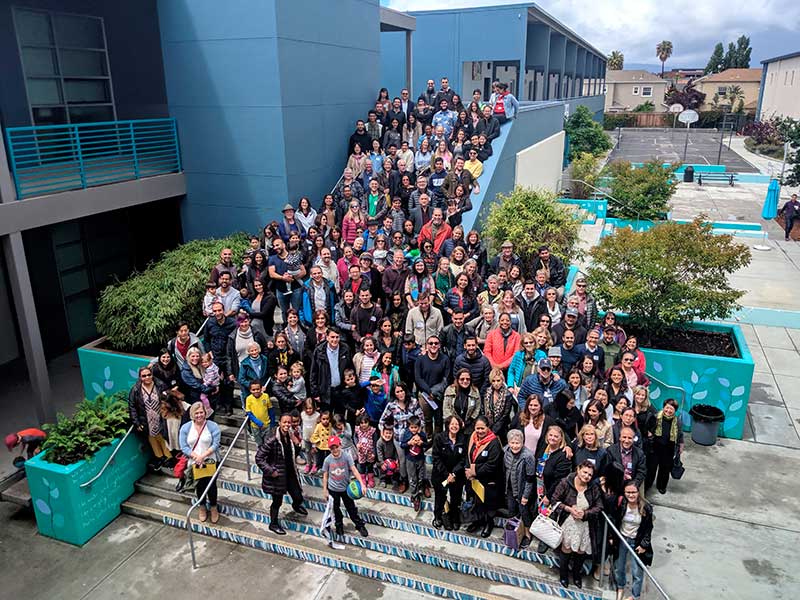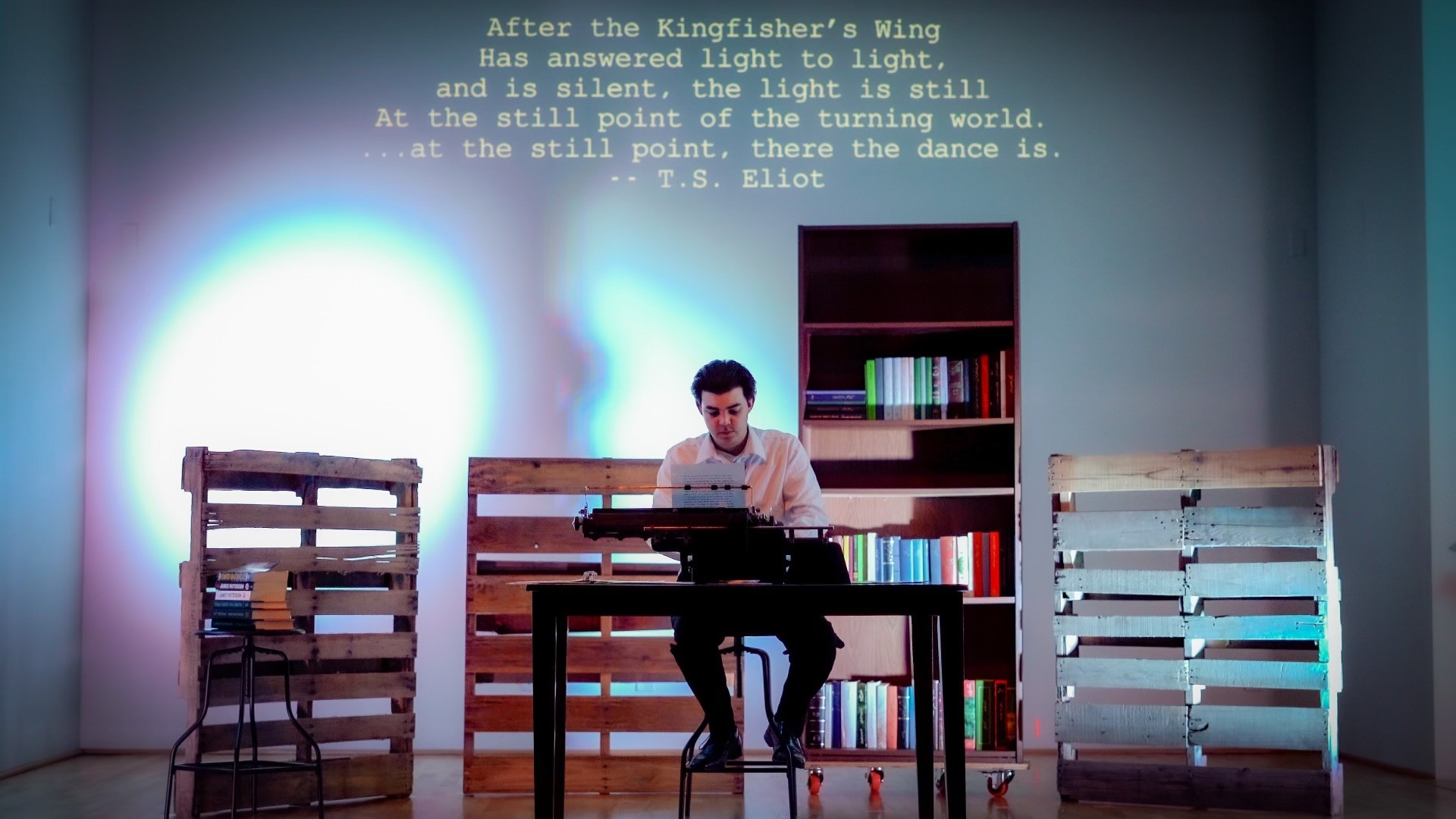
Individual initiatives call on creative approaches in crisis
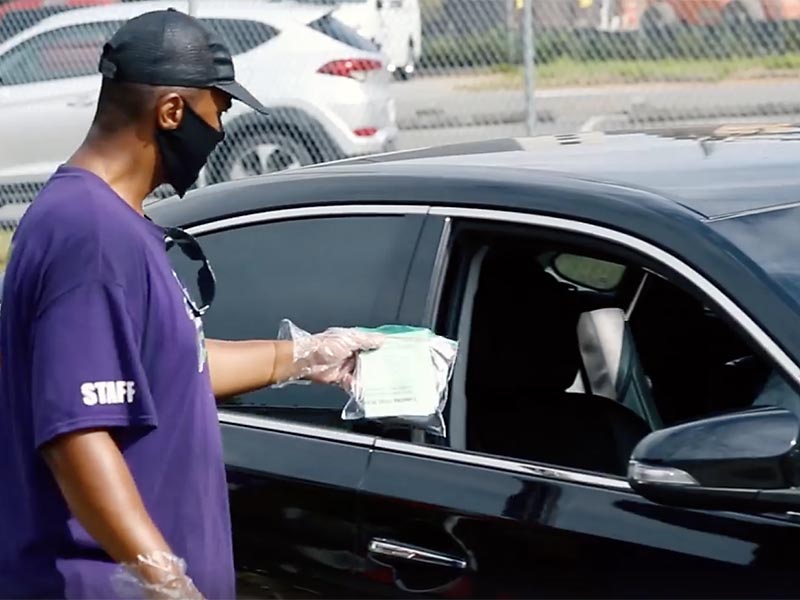
Updated frequently — latest: June 23, 2020
“If you’ve sung about your ‘Favorite Things,’ done your meditation, danced to ABBA, given the dog his fifth walk of the day and still the blues are consuming you, it just might be time to be of service.”
With that evocative statement, Francie LaRue, a Baha’i in Thousand Oaks, California, invited readers of the Thousand Oaks Acorn to work together for the common good.
“Being of service is considered a form of prayer in our faith,” she explained in a commentary published May 28. “We have no clergy in the Baha’i Faith, only servants. Being of service to others lifts their spirits as well as our own.”
That’s vitally important in times of crisis, LaRue noted: “When we are feeling overwhelmed with worry, mistrust, uncertainty and fear, it is more important than ever to be able to trust one another.
“The cries of ‘we are all in this together’ echo Baha’u’llah’s message that he brought to us over [150] years ago: The earth is but one country and mankind its citizens.”
“It seems,” she wrote, “that we are beginning to understand how interwoven and completely connected we are. We affect each other and are able to infect one another as well.”
***
Sonia Vader, a Baha’i in Concord, Massachusetts, is all about honoring those who serve their community.
The 13-year-old launched a basement effort, Circulating the Love, that aims to send a personal thank-you card to every local resident who is laboring on the front lines of the COVID-19 pandemic.
The first card went to her mail carrier. Others — she is able to make 25 cards a day — have gone to hospital and emergency workers.
She “paints abstract watercolors on paper, cuts them into circles after they dry and then writes an inspirational quote on one side and a unique personal note on the back,” according to an article on the online site of The Concord Journal.
“In my faith we believe that it’s important to (view) the purpose of life as to serve,” Sonia was quoted as saying. “I wanted to make sure [frontline workers] were feeling encouraged. My faith has really contributed to help me.”
***
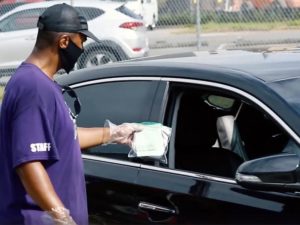
When Savannah, Georgia, Mayor Van Johnson sought to put more than 2,400 masks into the hands of residents, he chose Parent University to head up the effort.
Parent University, in turn, partnered with Wesley Community Centers to mount a giveaway.
“We wanted to get [the masks] to where they needed to be, and Parent University and Wesley Community Centers are wonderful partners,” Johnson explained in a video posted on Parent University’s Facebook page.
Michael O’Neal, a Baha’i in Savannah, is the executive director of Parent University. He founded the nonprofit program 22 years ago so parents could gain the tools to create a path of success for their children.
The video shows O’Neal and other volunteers handing out masks to motorists and pedestrians. Masks also were delivered to such places as nursing homes and homeless shelters.
“We think today’s donation of masks is very timely, because there are sectors of the community that may be letting their guard down,” O’Neal noted in the video.
“So we want to make sure that we keep in the public eye these masks and their importance …, because if people let their guard down now we could be doing this for a much longer time.”
O’Neal expressed his gratitude that the city recognizes Parent University “is connected in the community and we can serve in this way.”
***
Social distancing requirements have prompted director/actor Justin Baldoni to invite filmmakers to submit ideas that can generate “innovative and socially impactful films.”
Entrants in the competition, dubbed “The Six Feet Apart Experiment,” are encouraged to “look past social isolation and use these current circumstances to fuel their creativity,” according to a web story in the industry publication Deadline.
Up to five winners will be selected. They will receive $50,000 each and professional mentoring to aid in completing their film.
Baldoni, a Baha’i in Los Angeles, says the idea was inspired by Five Feet Apart, a 2019 feature film he directed. That movie depicts two cystic fibrosis patients whose developing relationship is governed by the necessity to maintain a physical distance of five feet.
Baldoni’s Wayfarer Entertainment was founded to create content that elevates the human spirit.
Earlier, in an interview published April 20 on the Today television show website, Baldoni explained how the pandemic has “opened a whole lot of new conversations” within his family.
Baldoni told how he and his wife, Emily, have introduced their two young children to “more of our spiritual toolbox” including prayer and meditation, complemented by breathing exercises and yoga.
“In our faith, prayer is our foundation and it’s seen as kind of the anchor in our lives. So we try to start and end our day by reminding ourselves that we’re a spiritual being having a physical experience,” he related.
A weekly study circle the couple hosts on Sundays has gone online, he said, and the pandemic has “reminded everyone not to take each other for granted. … [W]e’re rediscovering that physical distance doesn’t determine how close we are with one another.”
Baldoni also said crises such as the pandemic “present opportunities for humanity to mature” and that the “way this virus disproportionally spreads along lines of class and race will be just as undeniable as our material shortfalls.”
***
The children’s class Laura McLuckie-Khandan teaches with the assistance of youths successfully went online when the COVID-19 pandemic hit.
The youths are studying Teaching Children’s Classes, Grade 1, Book 3 in the Ruhi curriculum that prepares people to offer Baha’i-initiated core activities of community building. Their help with the children’s class is an invaluable experience.
But as the holy season of Ridvan grew nearer, a plan was needed for how to celebrate with the kids the 12-day period in late April.
So the Huntley, Illinois, Baha’i huddled — at a safe distance — with the youths and devised a way for them to lead programs marking three of the Holy Days.
For the First Day of Ridvan, one youth organized devotions with music. Another chose 12 items for the children to find that related to the story of that day in 1863 — when Baha’u’llah, prophet-founder of the Baha’i Faith, gathered with some followers and family in a garden in Baghdad and declared that He is the bearer of God’s message for this age.
“Then, I told the story and asked the children to take out the items they found,” relates McLuckie-Khandan. “For example, I mentioned that when Baha’u’llah got up to prepare for going to the garden he put on a taj,” a conical cap worn in the Middle East. “To remember this, we all put on hats we found on our quest.”
After the story, another youth demonstrated how to paint rocks and talked about the Kindness Rocks Project, a national initiative that encourages people to leave rocks painted with inspiring messages along paths.
The children began painting rocks. That craft continued on the other Holy Days as the children painted roses on the rocks and then set them out for people to find.
A few families created in their home a tent reminiscent of the one Baha’u’llah slept in during his time in the garden, and they joined the celebrations from within their tent.
***
TODAY also caught up with Baldoni’s fellow Baha’i Rainn Wilson for an interview on how the actor’s faith is helping him to stay centered and connected during the pandemic.
***
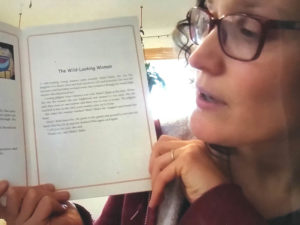
Sarah Scheffer, a Baha’i in Sioux City, Iowa, has launched a YouTube channel, Like unto a Pearl, to create content that can be used in virtual Baha’i-initiated spiritual education classes for children.
In some videos — there were four as of April 15 — Scheffer reads stories and quotes from the “Daily Reflections and Stories for Children” series of books by Munirih Hodge and Margo Styan.
In others, she sings songs such as “We Are Drops” and “Let the Flame” while playing the ukulele or with her husband, Mark, accompanying on guitar.
“What a thoughtful way to keep in touch — at a distance — with kids we work with and, potentially, others,” Mark Scheffer relates in spreading word of the channel.
***
An April 7 post to Facebook by Muni Tahzib, a Baha’i in Jersey City, New Jersey, and emergency care physician who has been unable to rejoin the fight against COVID-19 because she herself is battling the disease, has received an outpouring of response.
In the post, Tahzib described her continual bouts of fever and chills and shortness of breath. She told also of lying awake in “deep frustration” thinking about the “indescribable destruction and pain” this virus has caused humanity.
But in the “intense chirping of the birds” outside her window as they “seem to sing and celebrate the dawn of a new day,” Tahzib said her “soul is revived” by the countless “acts of kindness we are witnessing before our very eyes.”
And she is hopeful that this crisis will remind people to honor Mother Nature, see borders as artificial, and foster bonds of love and fellowship. In short, recognize that “humanity is one.”
***
In her periodic “Spiritually Speaking” column for the Eden Prairie News in Minnesota, Baha’i Nanette Missaghi addressed the coronavirus pandemic March 29 with a piece titled “Facing our deepest fears.”
An excerpt reads:
We are in a new place as human beings. The action we take now will influence generations to come. What will you do to reduce your fear and figure out how to serve? The best friend of fear is worry. I don’t have the answers but can offer my two cents. What helps me is the Baha’i long obligatory prayer. I have learned that the best time for me to say it is just before bedtime. It takes just 15 minutes of time and takes me from a place of nothingness where my spirit, brain and soul have let go to a place of tranquility. What meditation or prayer do you use?
Read the full story here.
***
A March 26 article in The Daily Northwestern told how Evanston, Illinois, resident Husayn Allmart and neighbors have designed several ways to maintain community cohesion during the pandemic.
One is a “bear hunt” that Allmart, a Baha’i who works in the Office of the Treasurer at the Baha’i National Center, helped organize.
“Participants put bears in their windows and listed their address in a Google Sheet,” the article reads. “Families with young children ‘hunt’ for these bears, using the Google Sheet as a guide. The bears ranged from stuffed animals to sketches.”
The article says Allmart wants to organize a similar hunt every week — each time with a different animal or theme.
“It has been really positive,” Allmart is quoted as saying. “It is a simple thing that we can do with our kids that is outside but still (respects) physical distance.”
Allmart has two 4-year-olds and told the newspaper the scavenger hunt is helping to get kids to go outside rather than stay glued to electronic devices.
“It makes us feel like a community,” Allmart says in the article. “It is a sweet thing we can all do.”
***
Lots of Baha’i musicians are sharing videos of their songs to cheer people up during the pandemic. But what about visual artists?
Jacqueline Claire Leal, a Baha’i in New Braunfels, Texas, has launched a podcast, Spiritual Conversation, in which she draws (pun intended) from her artistic process as well as life experiences and her faith for insights.
The first episode of the podcast is titled “Spiritual Resilience in the Time of COVID-19” and runs about 12 minutes. You can listen here — or on any of eight podcast platforms, using the search term “Jacqueline Claire.”
Leal calls the Spiritual Conversation series “a place to explore ideas and inspiration to help us all align with our spiritual purpose and live our best lives, no matter what challenges might be thrown our way.”
She adds, “I hope you will join me in authentic, uplifting discussions to equip us with tools, compassion and insight to help us navigate this life with creativity and grace.”
Leal also is creating a subscription project called 19 Days of Hope. It’s a series of daily emails starting March 30 “to help us be uplifted, happy, connected, ready to serve and full of hope during this uncertain time.”
***
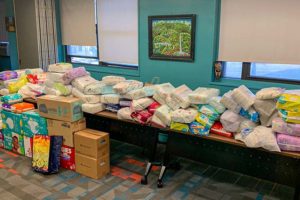
From the Baha’i World News Service
NEW ROCHELLE, New York — When the effects of the coronavirus disease (COVID-19) began causing disruptions to life in their neighborhood, a group of youth quickly turned their attention to pressing needs arising from school closures. In this suburb of New York City, these youth have been studying and serving together in Baha’i activities that develop their capacities for service to society.
As schools shut two weeks ago, many children were left without an important source of daily meals. While official arrangements for food distribution would soon be in place, the group of youth realized that the friendships and experience they had collectively developed through community-building initiatives, including food distribution efforts, would allow them to organize an immediate response in the interim.
Read the full story: “Youth group distributes food, gains city and National Guard support”
***
As in many places, Baha’is in the Rogers Park neighborhood of Chicago experienced a learning curve when a family moved its twice-monthly devotional gathering to videoconferencing.
“We discovered that group singing does not, unfortunately, work well over Zoom due to lag, but that individual songs come through beautifully,” the hosts relate.
“We also found that funny moments can happen when someone forgets to mute themselves. Everyone was very gracious and understanding with figuring out the technology.”
The change to videoconferencing using the Zoom application was posted on personal and Chicago Baha’i Facebook pages, and attendees included Baha’is in several states and an elderly friend of the Faith.
“We chatted about how everyone is doing, then spent about 45 minutes in prayer,” say the hosts.
“After prayers, we each shared ways in which we’re serving our communities, and read a few sentences from the recent National Spiritual Assembly letter guiding us to focus on service at this time.”
Some of the Baha’is in Rogers Park “are preparing extra fresh food for their neighbors, some are checking in via phone with or picking up groceries for the elderly Baha’is in their areas,” the family reports.
“And others were inspired by the experience and were so excited to host Zoom devotionals for their friends. We’re definitely going to do it again!”
***
Anuscè Sanai and Eric Solatka, Baha’is in Alexandria, Virginia, have begun reading bedtime stories via Facebook Live every evening at 7:30 EDT.
They wanted to show their daughters, ages 8 and 5, “what it means to find opportunities to serve under all circumstances,” says Sanai. “This one felt very easily doable.”
“We read children’s books that have a positive message,” she says. “Different characters, to be mindful of diversity and inclusion.”
Each week starts with the reading of a virtue card to give inspiration for the days ahead.
The couple hopes the initiative will help to “maintain a sense of community and also connect to others,” says Sanai.
***
Staying linked to one another also is on the minds of Emily Price and other Baha’i artists who are reaching out with songs of inspiration during the coronavirus pandemic.
“As I and so many musicians have been having all of our music gigs canceled and finding ourselves shut up at home, I was feeling the need to do the one thing that connects me with others the most,” says Price, an opera and choral singer in Chicago.
Her sister Rachael, lead singer for the band Lake Street Dive, “was supposed to perform on the [public radio] show Live From Here, and with that canceled they started a movement of musicians sharing music #livefromhome,” relates Price.
“Following their lead I wanted to share a song from my now postponed Chicago A Cappella swing music program, hence the classic ‘We’ll Meet Again!’
“It was also a reminder to reach out to your friends and check up on each other,” says Price. “It definitely worked, as I’ve caught up with Baha’i friends all over the world who reached out after watching the song.
“It’s a helpful, calming reminder of the souls’ connection to each other.”
***
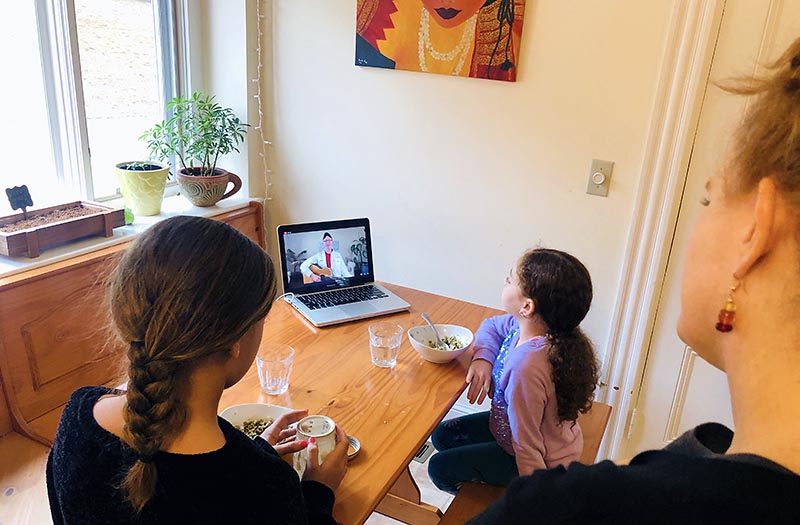
Acclaimed children’s performer Red Grammer, a Baha’i in Upland, California, is taking to the Internet with a weekly concert.
“I want to help bring some lightness and fun into your home, so during this wacky time I will be live-streaming a weekly concert from my Red Grammer Fan Page on Facebook Live,” reads Grammer’s announcement.
His concert series was scheduled to kick off at noon EDT on March 19.
“Let your friends and neighbors know! Let’s do this!” says Grammer.
***
From the Baha’i World News Service
MANTUA, Italy — In a time when many parts of the world are grappling with the global coronavirus disease (COVID-19) crisis, Baha’is in some of the most affected areas are finding ways to be of service to their societies. Years of experience with community-building activities have equipped them to respond with creativity and resourcefulness to the current circumstances.
In Italy, where preventive measures have now confined most people to their homes, communities continue activities that bring hope. Many such initiatives have temporarily moved online, with people holding video conference calls to provide support to one another, to pray together, and to advance the educational endeavors of the Baha’i community that build bonds of friendship and capacity for service to society.
Read the full story, “Hope and support in Italy during a global health crisis,” at https://news.bahai.org/story/1401/.
***
Reflections on the Coronavirus and the Oneness of Humanity (Personal reflection originally posted on bahaiteachings.org)


